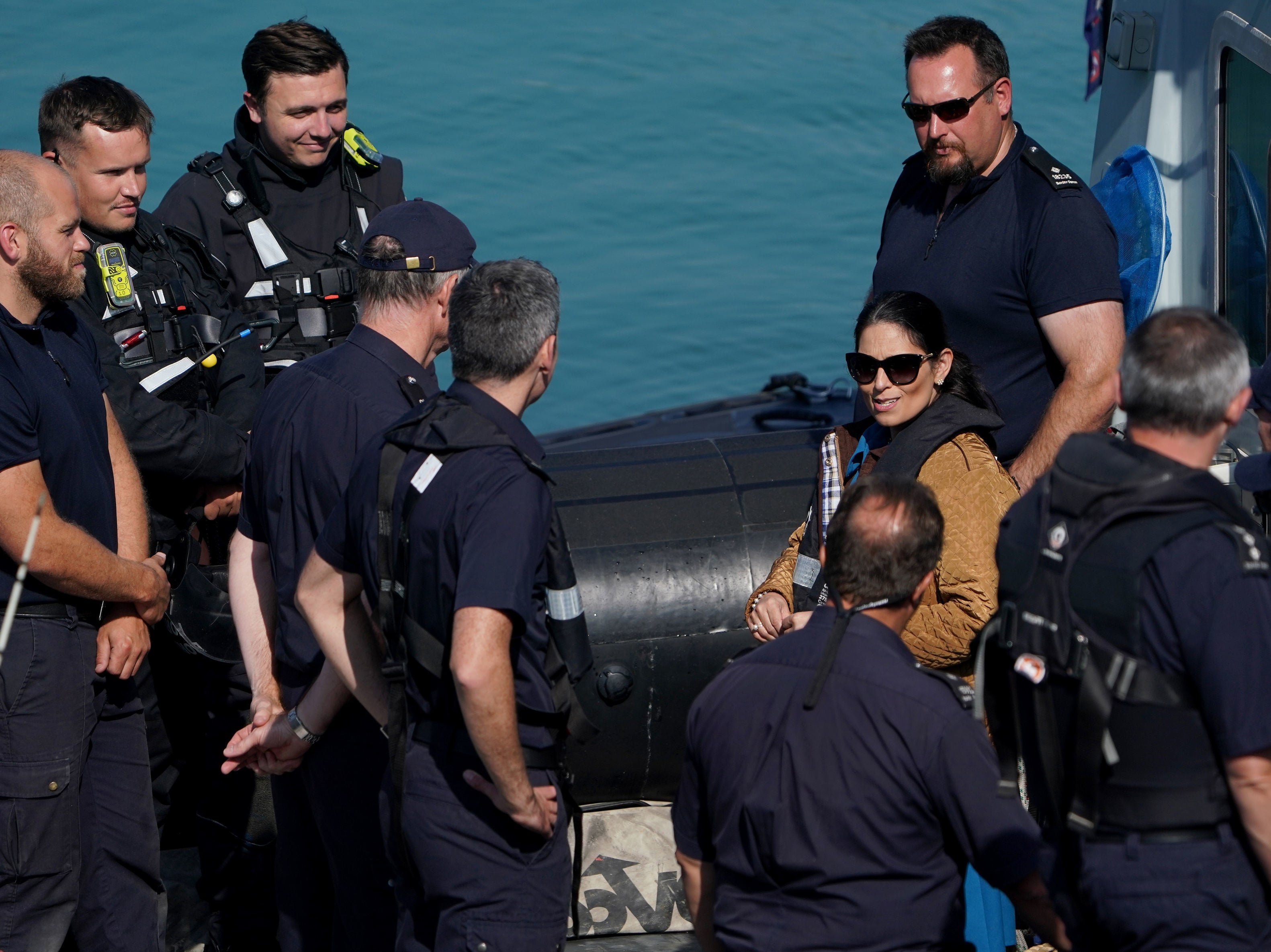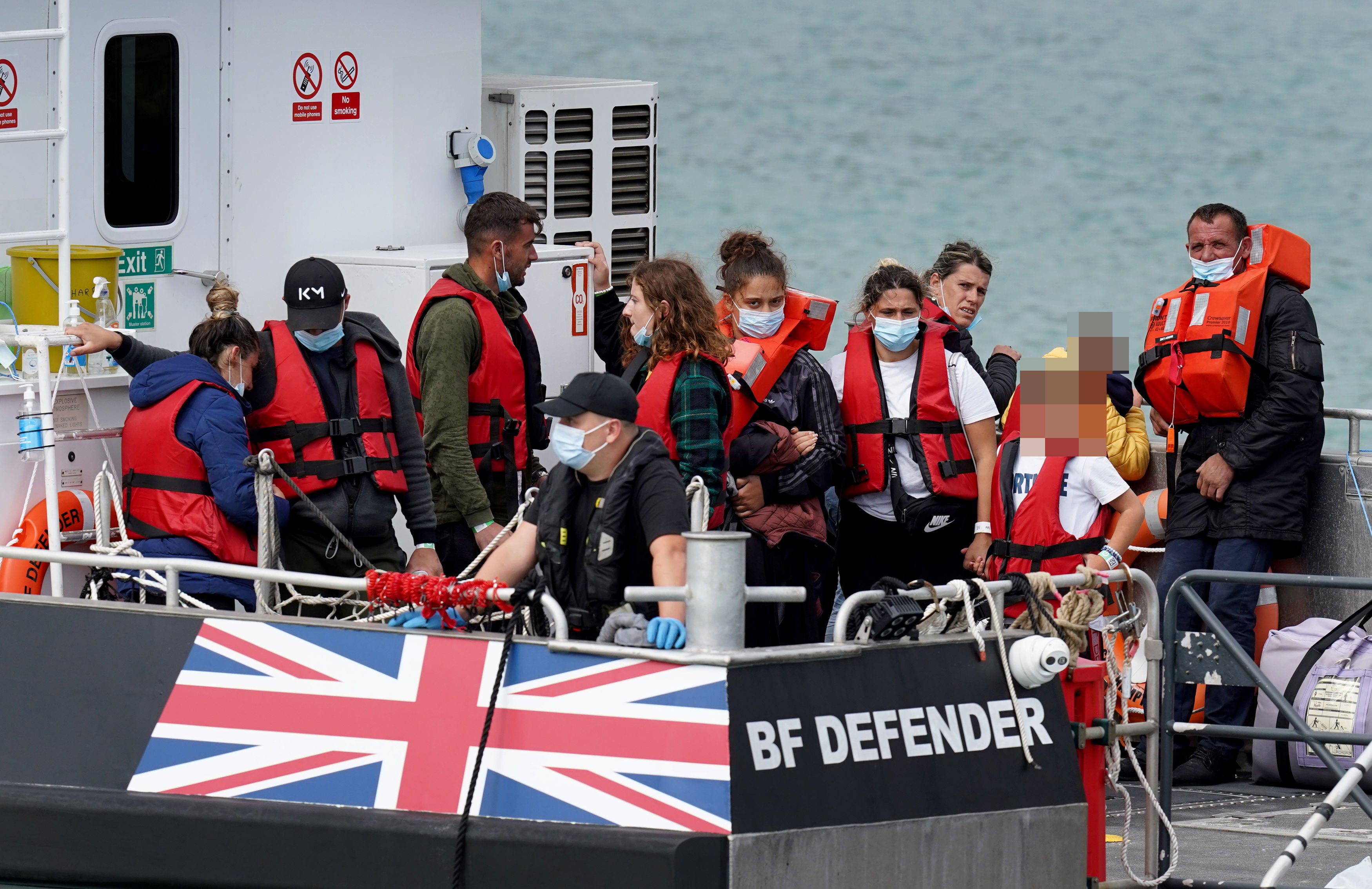Few arrests under law Priti Patel said would ‘deter’ Channel crossings as numbers soar
Home Office says 38 people have been arrested under Nationality and Borders Act powers as crossings hit new record

Your support helps us to tell the story
From reproductive rights to climate change to Big Tech, The Independent is on the ground when the story is developing. Whether it's investigating the financials of Elon Musk's pro-Trump PAC or producing our latest documentary, 'The A Word', which shines a light on the American women fighting for reproductive rights, we know how important it is to parse out the facts from the messaging.
At such a critical moment in US history, we need reporters on the ground. Your donation allows us to keep sending journalists to speak to both sides of the story.
The Independent is trusted by Americans across the entire political spectrum. And unlike many other quality news outlets, we choose not to lock Americans out of our reporting and analysis with paywalls. We believe quality journalism should be available to everyone, paid for by those who can afford it.
Your support makes all the difference.Only 38 people have been arrested for facilitating a record number of Channel crossings under new laws the government claimed would deter small boats, new figures show.
Priti Patel said a suite of controversial immigration offences targeting asylum seekers who reach the UK in dinghies would “break the business model of the smuggling gangs”, but 1,295 people made the journey in a single day on Monday.
The Home Office said 38 people have so far been arrested on suspicion of “facilitating” small boat arrivals under the Nationality and Borders Act - a law used to target asylum seekers for steering their own dinghies.
It could not provide figures on other arrests under the new laws. Since they came into force in June, more than 10,000 migrants have arrived in Britain on small boats and the total for 2022 is running at a record high.
A string of previous prosecutions targeting asylum seekers who steered dinghies over the Channel were found to be unlawful by the Court of Appeal because they had not technically entered the UK, and so were innocent of facilitating illegal entry.
The new act changed the legal definition of the crime to cover migrant boats intercepted at sea, lowered the bar for “assisting unlawful immigration” charges and increased prison sentences.
Stephen Kinnock, the shadow immigration minister, told The Independent: “The government claimed that by creating this offence they would deter people from trying to cross the Channel in small boats, but with the number of crossings soaring it is now crystal clear that this is yet another one of Priti Patel's headline-chasing schemes that has completely and utterly backfired.
”Instead of wasting time, resources and taxpayers' money on these pie-in-the-sky plans, the government should adopt Labour's policy of switching funding to properly resource the National Crime Agency so that it can be more effective in tackling criminal gangs.“
Bella Sankey, the director of Detention Action, said “no one should be arrested or punished” for trying to seek asylum in the UK.
“Without more transparency over these arrests we are deeply concerned that, instead of offering people asylum, support and compassion, this government may be putting them behind bars,” she added.
Backing the bill in the House of Commons last year, the home secretary told MPs: “It will deter illegal entry to the UK, and, importantly, will break the business model of the smuggling gangs and protect the lives of those whom they are endangering.”
The House of Lords attempted to stop the law criminalising small boat crossings, following warnings from the UN Refugee Agency that moves to treat asylum seekers differently based on their method of arrival was “in direct breach of the Refugee Convention”.
Throwing out the Lords amendments in March, immigration minister Tom Pursglove said the government would not “attempt to prosecute every illegal entrant” and would “focus on egregious cases”.
The number of Channel crossings has continued to rise despite the Royal Navy leading the response at sea, the announcement of the Rwanda deal and unfulfilled threats to force boats back into French waters.
The Home Office has pursued a policy of “deterrents” aiming to reduce small boat crossings, with Ms Patel pledging that she would make the route “unviable” in August 2020, despite calls from parliamentary committees to provide more safe and legal alternatives.
More than 17,000 migrants have arrived on small boats since Boris Johnson announced that the navy would “take over operational command from Border Force in the Channel” in April.
On the same day, the home secretary announced the deal to send asylum seekers to Rwanda, which she also claimed would be a deterrent.
The scheme, which has been paused until the outcome of a legal challenge in October, targets asylum seekers deemed “inadmissible” for consideration under the UK’s immigration laws because they have travelled through safe third countries.

The total of almost 22,700 migrants arriving on small boats so far this year is 80 per cent higher than the 12,500 seen by the same point in 2021.
The PCS union, which represents Border Force staff and is among the groups challenging the Rwanda deal, said the figures “leave the home secretary’s argument in tatters”.
Head of bargaining Paul O’Connor said: “The home secretary has spent months attempting to justify her Rwanda policy by claiming that it is a deterrent. Indeed, this will be a key plank of her argument in trying to justify the policy when our legal challenge is heard at the High Court next month.
“The policy is not a deterrent. It is simply immoral, unlawful and unworkable, and should be dropped immediately.”
The PCS called for the Home Office to resource civil servants to “do their jobs properly, free from political interference” amid rocketing backlogs for asylum decisions.
Under British law, people must be present in the UK in order to claim asylum but there is no visa to reach the country for that purpose.
Britain was previously part of an EU-wide deal that allowed asylum seekers to be sent to other countries deemed responsible for their claims, but the mechanism was lost during Brexit and has not been replaced.
A Home Office spokesperson said: “Since the new measures under the Nationality and Borders Act came into force numerous arrests have been made, which includes 38 people arrested specifically for facilitating illegal entry to the UK. Other arrests have been made and will be published in our quarterly immigration statistics.”



Join our commenting forum
Join thought-provoking conversations, follow other Independent readers and see their replies
Comments